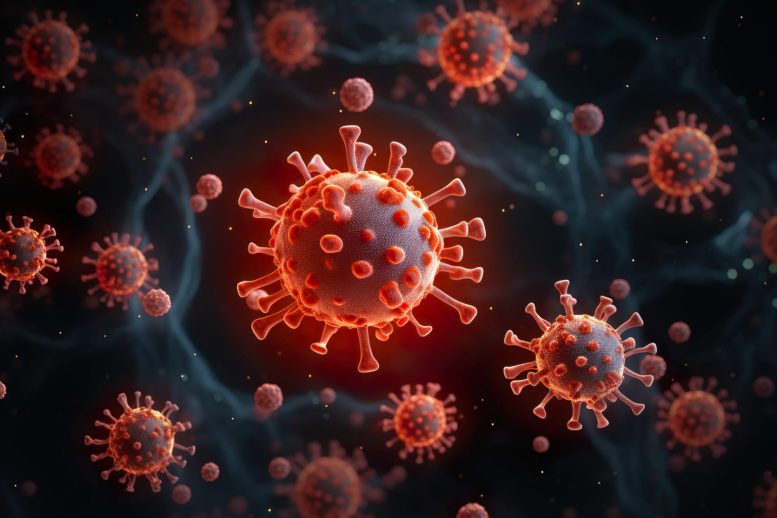
New research from UC San Francisco has found that COVID-19 can remain in the blood and tissue of some patients for over a year after infection, offering insights into the development of long COVID symptoms. The studies led by Michael Peluso reveal COVID antigens persisting in the blood for up to 14 months and in tissue samples for over two years, suggesting a possible link to long-term health effects.
The COVID-19 virus can persist in the blood and tissue of patients for more than a year after the acute phase of the illness has ended, according to new research from UC San Francisco that offers potential clues to why some people develop long COVID.
The scientists found pieces of SARS-CoV-2, referred to as COVID antigens, lingering in the blood up to 14 months after infection and for more than two years in tissue samples from people who had COVID.
“These two studies provide some of the strongest evidence so far that COVID antigens can persist in some people, even though we think they have normal immune responses,” said Michael Peluso, MD, an infectious disease researcher in the UCSF School of Medicine, who led both studies.
The findings were presented at the Conference on Retroviruses and Opportunistic Infections (CROI), which was held March 3 to 6, 2024, in Denver.
Evidence of long-term infection
Early in the pandemic, COVID-19 was thought to be a transient illness. But a growing number of patients, even those who had previously been healthy, continued having symptoms, such as, brain fog, digestive problems, and vascular issues, for months or even years.
The researchers looked at blood samples from 171 people who had been infected with COVID. Using an ultra-sensitive test for the COVID “spike” protein, which helps the virus break into human cells, the scientists found the virus was still present up to 14 months later in some people.
Among those who were hospitalized for COVID, the likelihood of detecting the COVID antigens was about twice as high as it was for those who were not. It was also higher for those who reported being sicker, but were not hospitalized.
“As a clinician, these associations convince me that we are on to something, because it makes sense that someone who had been sicker with COVID would have more antigen that can stick around,” Peluso said.
Virus persists for up to two years in tissue
Since the virus is believed to persist in the tissue reservoirs, the scientists turned to UCSF’s Long COVID Tissue Bank, which contains samples donated by patients with and without long COVID.
They detected portions of viral RNA for up to two years after infection, although there was no evidence that the person had become reinfected. They found it in the connective tissue where immune cells are located, suggesting that the viral fragments were causing the immune system to attack. In some of the samples, the researchers found that the virus could be active.
Peluso said more research is needed to determine whether the persistence of these fragments drives long COVID and such associated risks as heart attack and stroke.
But, based on these findings, Peluso’s team at UCSF is involved in multiple clinical trials that are testing whether monoclonal antibodies or antiviral drugs can remove the virus and improve the health of people with long COVID.
“There is a lot more work to be done, but I feel like we are making progress in really understanding the long-term consequences of this infection,” Peluso said.
Meeting: Conference on Retroviruses and Opportunistic Infections (CROI)
The studies were supported by funding from the PolyBio Research Foundation to support UCSF’s Long-Term Impact of Infection with Novel Coronavirus (LIINC) Clinical Core and a Merck Investigator Studies Program Grant. The National Institute of Health’s National Institute of Allergy and Infectious Diseases also provided funding (3R01AI1411003-03S1, R01AI158013 and K23AI134327, K23AI157875 and K24AI145806). Additional support came from the Zuckerberg San Francisco General Hospital Department of Medicine and Division of HIV, Infectious Diseases and Global Medicine.









I still will never ever comply to the jab !!!! Because it’s a false flag
Man modern “science” is really figuring out how to milk this puppy for every last $$$$$ they can from people.
Creating lifetime customers is their job, not healing people or making them more healthy.
MORE MEDS!!!! TAKE OUR PILLS!!!!!
Were these people vaccinated with mRNA vaccines? This is an essential question. If they were, the mRNA fragments of spike protein could be from the vaccine and not from surviving virus. They should compare people vaccinated who have had COVID to un-vaccinated people who have had COVID. Otherwise, you can’t know if this is from virus staying in the body, or from mRNA from the vaccine that has become incorporated into DNA by a reverse transcriptase, or some other mechanism whereby spike protein is made continually by the vaccine.
And the chicken pox virus will stay in your body a lifetime; potentially reemerging as shingles. Virus gonna virus.
Good point.